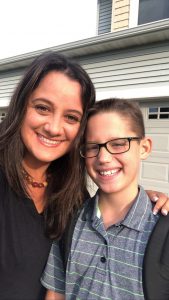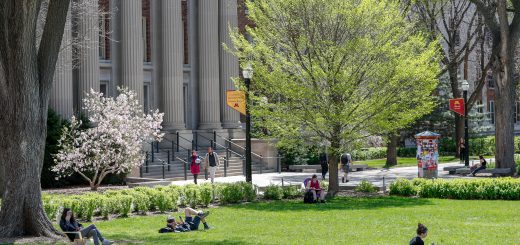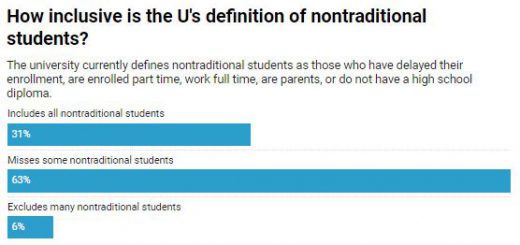Student parents face a balancing act
The University provides policy and outreach, but many would love more resources and support.

By Natalie Cierzan and Maya Harris
If she has to choose between going to classes and attending to her child’s needs, University of Minnesota undergraduate Karla Boirivant knows her main priority.
She will choose her son — whether that means staying home with him while he’s sick or attending his school events. The 33-year-old biology major says she can miss lectures or make up work on her own, but she doesn’t want to miss those precious moments with her son.
While the University’s attendance policy granted her an excused absence when he was sick, it
didn’t grant her special treatment. “I don’t plan on being a slacker, but my child could be sick or things could come up in the middle of the semester that I don’t know,” she said.
Policies around attendance are one of several issues that make life a little tougher, say student
parents. Others include the isolation they sometimes feel among their classroom peers as well as the inherent difficulty of balancing the needs of family with academics. While the University does provide policy and some outreach for them, many student parents agree it would be great to have more resources and support.
In the end, much depends on the kindness of faculty.
“I try to be understanding when my students miss class,” said Mandy Menke, a Spanish professor at the University. “Life can get challenging sometimes… Student parents obviously
face a different challenge than traditional students do.”
Policy has limits
The University’s attendance policy only excuses absences for a student’s dependent if they are physically or mentally ill. The policy does not include other common reasons parents might need to stay home with children, such as school-release days or weather cancelations, which can vary by school district. In those cases, it’s left to the professor’s discretion to either be more lenient or stick to the policy’s guidelines.
“Ultimately the decision is with the instructor on how much is too much missing of class that
you can’t be adequately graded or assessed on the knowledge in the course,” said Jessica
Kuecker Grotjohn, the assistant to the vice provost and dean of undergraduate education and a policy contact for educational policies under the vice provost.
From her experience, faculty are often understanding when it comes to the needs for students and their dependents.
“Last year, there were many days where school was canceled due to weather, and I think that’s a challenge that many faculty and instructors can also relate to, because they may have dependents of their own who may be [affected] by school closures,” she said.
According to the official policy, child care issues aren’t legitimate absences and are left to the
discretion of the professor.
Professors will generally work with student parents who have occasional child care issues, but
that may not happen if it’s a weekly occurrence, said Michael Huyen, the assistant director of the Student Conflict Resolution Center and an ombudsman.
If faculty resistance becomes an ongoing problem, student parents can appeal to the center.
“We do not take any action unless we’re explicitly told by the student,” Huyen said, noting that
student parents face a variety of issues requiring support. “It’s a good place for our students to
come in and establish a plan for whatever the issue is.”
It all depends
Some classes present more challenges than others. In the language department, for example, it is very common for classes to be held four days a week.
“Most language classes are four days a week because learning a language requires a lot of
practice. It would be easy to lose what you are learning if you don’t practice everyday,” Menke, the Spanish professor.
In the College of Liberal Arts, students are required to take the equivalent of four semesters of a language. Other colleges around the university have similar requirements. Taking a class that requires four days puts special demands on student parents.
“One of the biggest issues I see with students I have had is missing class time,” Menke said. “I
have had student parents before and it can become difficult for them when a child is sick or
another issue arises.”
In such cases, the legitimate absences policy allowing makeup work has limits, Menke said.
Although assignments might be fulfilled, a lot of the grades in these courses come from
participation points.
Regarding science classes and labs, chemistry professor Michelle Driessen hasn’t seen a
difference in the difficulty of making up classwork for student parents compared to other
traditional students.
Many of the nontraditional students she has encountered in her classes care for dependents in
some way or another, such as caring for parents, grandparents or siblings.
“When I’ve known someone is a parent, they tend to be more mature students and very focused on their course work,” she said. “They also tend to be more organized, out of necessity, than our ‘average’ student on campus.”
Breaking isolation
Karen Oscarson, a 43-year-old biology major, says her children were cared for by their
grandparents when she was traveling to campus, lessening the number of classes she missed in emergencies.
“If that hadn’t been the situation, I’d have some daycare issues,” she said.
She often felt social isolation as a student parent, which she said is doubled for her as an older
parent. When she would mingle with peers in the College of Biological Science, she wouldn’t
know if they were parents; but if they were, she would assume because they were younger than she they were managing differently.
Boirivant, the biology major, said help for her did not come from policy at the University. It
came through the Student Parent Help Center, where she found solidarity and support in the
student group, PASS (Parents As Student Support).
“It’s probably one of the only times and places where I can socialize and feel included as a
student,” Boirivant said.
Na King Xiong, a student parent counselor with PASS, said topics in the group can include how
to manage study skills, career planning, finances, stress management, and child development – whatever members bring to the agenda.
“PASS allows student parents to share their parenting or academic concerns with one another,” Xiong said. “It gives them a chance to hear and give each other advice on how to handle a situation….It provides a space for our student parents to build a community with one another since it can be a challenge for them to relate or connect with their own classmates.”
During regular campus operations, PASS met every Wednesday from 12 to 2 p.m. in 24 Appleby Hall. They have so far not started Zoom meetings.
Oscarson is still getting used to taking her biology classes at home since the COVID-19
pandemic. Now, although she may not need to commute every day from Rochester, Minnesota — a typical hour and a half to get to the Twin Cities campus every day — she faces a new challenge of being at home with her three children, who are trying to learn as well.
While she said professors have done a good job making the transition, she prefers in-person
classes and doesn’t like taking her tests on the computer. When she tests in a classroom, she isn’t at risk of being interrupted by her child.
She’s still working through it and watching her grades carefully in each of her classes.
“If I fail one class in my entire life, there’s worse things,” she said.



